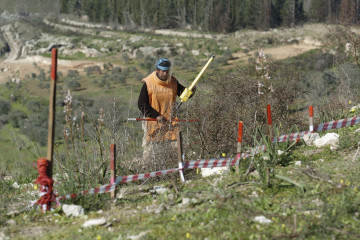

Subhi was clearing the brush around his olive trees last month, a routine task, when he came across something out of the ordinary. A piece of metal was poking out between the fallen branches Subhi was about to rake. Immediately, he called the Lebanese army.
Subhi had stumbled across the leftovers of a cluster bomb fired by Israel during the 2006 war with Lebanon which had somehow survived unnoticed on his farm for 17 years.
“If I had just taken a few steps forward, maybe I would have been killed. The army had to detonate it,” Subhi H, a farmer in the town of Deir Mimas, told The New Arab.
"Those who remain in the town are trying to pick their olives as quickly as possible, fearful that a widening war will rob them of their harvest"
The United Nations estimates that there are over 1 million unexploded bombs across Lebanon, a result of Israel’s use of cluster munitions during the 2006 war.
The use of cluster munitions – weapons that release up to hundreds of small bombs over a wide area – is banned by most countries.
The town of Deir Mimas, a sleepy Maronite Christian town just 4 kilometres from the Lebanese-Israeli border, was heavily impacted during the 2006 war with Israel.
To this day, certain areas of the town are off-limits as they have not been cleared of cluster munitions. Farmers say that the soil and its produce have not been the same since, which they blame on chemicals leaking from the bombs that fell on their fields.
|
Deir Mimas is renowned for its olive oil production across Lebanon and the world alike. Dubbed the “Bordeaux of Olive Oil,” just half a litre of the town’s olive oil fetches $25 USD abroad.
Residents speak proudly of the olive oil's distinct dark colour, distinct from the bright yellow hue of oil produced in other parts of Lebanon.
However, the town and its famed olive oil have once again been put in jeopardy by the looming spectre of a war with Israel.
This time, escalating clashes between pro-Iran militia Hezbollah and Israel have erupted in the middle of the olive harvest season.
“All of the workers who usually pick the olives have left because of the situation, so much of the olives have been left unpicked,” Michel Bechara, a 27-year-old olive farmer in Deir Mimas, told The New Arab.
Bechara had to travel to the Bekaa Valley further north to find Syrian workers who would be willing to help him harvest his olives. He has 15 workers working the fields, renting out houses in the town to accommodate them.
In regions closer to the border where there has been active shelling, farmers have had to completely stop their harvests, as they cannot access their farms at all.
“Within one to two months it will be too late to harvest at all. It’s impossible for them to harvest now because of the confrontations,” Mohammed al-Husseini, the head of the south Lebanon farmers syndicate, told The New Arab.
Al-Husseini added that almost all residents in the south with land are at least partially dependent on agriculture, whether it be olives or tobacco farming.
Lebanon’s olive harvest season started at the beginning of October and is set to end in mid-November.
Will there be war?
It is unclear how long the clashes between Israel and Hezbollah will last or whether they will widen into a full-scale war.
Thus far, fighting has been confined to rocket exchanges within a few kilometres of the border on either side. Civilians have been displaced en-masse on both sides of the border, but casualties have been mostly confined to active combatants.
Hezbollah and its Iranian backers have warned Israel that if it is to conduct a ground invasion of Gaza, that it could open a second front with Israel along the Lebanese-Israeli border.
At a rally in Beirut on 18 October, the head of Hezbollah’s executive council Hashem Safieddine said the Lebanese militia was “thousands of times stronger than before,” and warned Israel not to make a “mistake” in the coming days.
Israeli officials, in turn, have threatened to send all of Lebanon “back to the stone age” if Hezbollah tries to open a second front.
Residents of Deir Mimas are watching the news nervously, checking if the sounds of shelling they are hearing will remain in the distance or are the sounds of a war creeping closer. Those who remain in the town are trying to pick their olives as quickly as possible, fearful that a widening war will rob them of their harvest.
“Our olives have sustained this town for generations. Our olives have gotten doctors through schools, officers in the army, and sent our children abroad. Everyone has some connection to olives here,” Merhej Shamaa, an olive farmer in Deir Mimas, said.
“In 2006, our olive production was heavily impacted, destroyed by shelling and until today, their yield is impacted. If a war happens now, it will be much worse than 2006.”
William Christou is The New Arab’s correspondent in Beirut, covering the politics of the Levant and Mediterranean. Previously he worked for Al Jazeera in Doha and Syria Direct in Amman
Follow him on Twitter: @Will_Christou
![Syrian workers came from the Bekaa valley to help Deir Mimas with its olive harvest, they say they are compelled to work despite the tensions on the border due to their poor financial situation. [William Christou - TNA]](/sites/default/files/styles/large_1_1/public/2023-10/830A9977%20-%20instasize.jpg?h=2992ba0a&itok=eaCExruw)
![Residents of Deir Mimas dip flat bread into olive oil without any other condiments, savouring the local delicacy. [William Christou - TNA]](/sites/default/files/styles/large_1_1/public/2023-10/olive%20oil.jpg?h=543fc18e&itok=_-OCshEG)



 Follow the Middle East's top stories in English at The New Arab on Google News
Follow the Middle East's top stories in English at The New Arab on Google News


